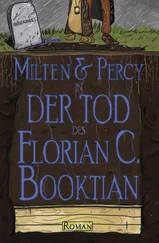“Well—”
“I do, Raine!” cried Lucy, hugging Raine’s arm.
Raine, color high in her cheek, spoke to me with her head ducked, as flirtatiously as Siobhan. Was this her way of being shy about her mystical convictions?
“There’s a force field around all of us, waxing and waning,” said Raine absently, suddenly waning herself, losing interest. She spoke a little more, but inattentively.
“Maybe you’re right, Raine.” I could never figure out the enthusiasm of movie folk. It was as if they were possessed fitfully by demons, but demons of a very low order to whom one needn’t pay strict attention.
Miss Maude, like Lucy, fixed on Raine, eyes glistening.
Dana came moseying in, thumbs hooked in his jeans. Miss Maude’s eyes bulged. He was something to see. Maybe he was the new sunlit god come to save this sad town. But when, ignoring us, he began to talk to Raine, it was about his — investments! Bad news from London, where he had bought a pub which made money but the government took 90 percent of it! “Christ, if I had just listened to Bob about Cayman,” and so forth — fretting! eyes crossed with worry about alimony and taxes, and all at once you saw that he was an optical illusion, a trick, that his beauty was not only accidental and that he had no part in it but that he didn’t even credit himself with it. He was like a hound dog wearing a diamond necklace.
Miss Maude was suddenly possessed by a demon all her own. Imploringly, almost tearfully, eyes glistening, she offered Raine her house for the scene between Lipscomb the decadent planter and his aunt, a strong aristocratic type (“Christ, can’t you see Ouspenskaya doing her!” said Merlin), who tells him his true strength comes from the land. “You always have the land! The land is eternal!” and so forth. Miss Maude seemed to know all about the movie.
“Thank you, Maude,” said Raine, giving her a hug. “I’ll tell Jan and Bob.” Raine, I saw, was in a kind of ecstasy of benevolence. It pleased her to be nice to Miss Maude. Raine’s face shone like a saint’s or like Ingrid Bergman’s. Was it the hurricane which excited her or the exaltation of being a movie star and confirming her stardom in the faces of ordinary folk?
I blinked. All at once Miss Maude, whom I had known all my life or thought I knew, went off her rocker. Or she had been off her rocker for forty years and now at last came to herself. In fact she said so.
Her face suddenly wrinkled up like a prune, her eyes glittered with tears. At first I thought she was crying, but it was not grief, it was happiness, gratitude. She twisted a handkerchief in her hands.
“I just can’t tell you what it means to me,” said Miss Maude, pumping her tired hands back and forth.
“Raine got Jan to give Miss Maude a walk-on in the library scene,” explained Lucy.
“Is there any way I can tell you?” implored Miss Maude, coming ever closer to Raine, wringing her hands, frantic with an emotion not even she could name.
“You did a good job,” said Raine, backing off, getting a little more than she had bargained for. “You’re a beautiful person. Maude.”
“Oh, Raine, Raine, Raine,” said Maude and actually threw back her head and closed her eyes.
I looked at Maude in astonishment. Had everybody in this town gone nuts or was I missing something? The special nuttiness of the movie people I was used to, but the town had gone nuts. Town folk, not just Maude, acted as if they lived out their entire lives in a dim charade, a shadow-play in which they were the shadows, and now all at once to have appear miraculously in their midst these resplendent larger-than-life beings. She, Maude, couldn’t get over it: not only had they turned up in her library, burnishing the dim shelves with their golden light; she had for a moment been one of them!
Presently Mrs. Robichaux, a dentist’s wife, whom all these years I had taken to be a mild comely content little body, showed up from nowhere and told Raine she would do anything, anything, for the company: “even carry klieg lights!”
The world had gone crazy, said the crazy man in his cell. What was nutty was that the movie folk were trafficking in illusions in a real world but the real world thought that its reality could only be found in the illusions. Two sets of maniacs.
Somehow they had dropped the ball between them.
Lionel came in close with the Arriflex camera saddled on his shoulder. Again Dana moved against Margot. He looked straight into her eyes, lazily and with no difficulty. Margot looked back with difficulty. Three lights were reflected in her pupil.
Jacoby held both of them, his bent hands on their shoulders, eyes fixed on the floor, like a referee talking to boxers.
“Dear,” he said to Margot, “this time let’s try it this way. I want your legs wrapped around him.”
He’s not from Poland, I thought. He’d lost his accent again.
“How?” asked Margot faintly.
“How? Christ, just do it. He’ll help. He’s going to grab your ass and hold you off the floor. Don’t worry.”
“All right.”
“And when you say your one line: ‘You will be gentle with me, won’t you?’ I want to hear both fear and tenderness. Can you manage that, dear?”
“I’ll try.”
“Yeah, all right. You ready? Remember, Dana, I want to hear the zipper. It’s important.”
“Yeah. Right.”
“Merlin,” I asked, “what happens to, ah, Lipscomb in the end?”
Merlin shrugged. “Just what you might suppose. He is almost reached, first by the stranger, then by his own aunt. But in the end he slips away from both. He gently subsides into booze and Chopin. Sarah opts for life, he for death. The stranger is immolated by a town mob who think they hate him but really hate the life forces in themselves that he stirs. He is the new Christ, of course.”
I walked back to Belle Isle on the levee. Sure enough, the air had got heavy and still. Yet far above, black clouds were racing, fleeing north of their own accord like the blackbirds which rose from the swamp disquieted. A yellow light filled the space between earth and clouds as if the Christmas bonfires were already burning.
I couldn’t stand it. I still can’t stand it. I can’t stand the way things are. I cannot tolerate this age. What is more, I won’t. That was my discovery: that I didn’t have to.
If you were right, I could stand it. If your Christ were king and all that stuff you believe — Christ, do you still believe it? — were true, I could stand it. But you don’t even believe it yourself, do you? All you can think about is that girl on the levee. No wonder you don’t have time to pray for the dead. All you can think about is getting that girl over the levee into the willows.
No? But if what you once believed were true, I could stand the way things are.
Or if my great-great-grandfather were right, I could live with that. Do you know what he did? He had a duel! Not a gentlemanly affaire d’honneur under the Audubon oaks in New Orleans, but a fight to the death with fists and knives just like Jim Bowie, in fact on the same sand bar. He had won a lot of money in a poker game in Alexandria. The heavy loser took it hard and began muttering about cheating. That was bad enough. But he made a mistake. He mentioned my kinsman’s mother’s name. She was a d’Arbouche from New Roads. Now my kinsman was a swarthy man; he looked like Jean Lafitte. “What’s that you said?” he asked the fellow, who then said something like, “You got the right name all right.” “And how is that?” asked my ancestor pleasantly. “Well, it’s d’Arbouche, isn’t it, or is it Tarbrouche?” Which was to say that my ancestor had a touch of the tarbrush which was in turn to say that his mother, a very white Creole lady, had had sexual relations with a Negro, and offhand it is harder to say which was the deadlier insult: that she had had sexual relations with a man other than her husband, or that the man was a Negro. “I see,” said my ancestor. “Well, I’ll tell you what I propose. You and I will meet in four hours, which is dawn, on the Vidalia sand bar, which is outside the jurisdiction of both Louisiana and Mississippi. With one Bowie knife apiece. No seconds.” They met. Seconds did come but were scared and hid in the willows. They fought. My ancestor killed his man, was badly cut on the arms and face, but managed to grab the fellow, turn him around, and cut his throat from ear to ear. Then he sent for an ax, beheaded, dismembered, and quartered the body, and fed it to the catfishes. He washed himself in the river, bound his wounds, and he and his friends rowed over to Natchez-under-the-Hill and ate a hearty breakfast.
Читать дальше












